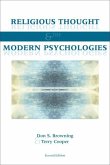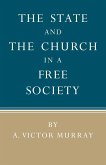Starting with Freud's "projection theory" of religion -- that belief in God is merely a product of man's desire for security -- Professor Vitz argues that psychoanalysis actually provides a more satisfying explanation for atheism. Disappointment in one's earthly father, whether through death,
absence, or mistreatment, frequently leads to a rejection of God. A biographical survey of influential…mehrStarting with Freud's "projection theory" of religion -- that belief in God is merely a product of man's desire for security -- Professor Vitz argues that psychoanalysis actually provides a more satisfying explanation for atheism. Disappointment in one's earthly father, whether through death, absence, or mistreatment, frequently leads to a rejection of God. A biographical survey of influential atheists of the past four centuries shows that this "defective father hypothesis" provides a consistent explanation of the "intense atheism" of these thinkers. A survey of the leading intellectual defenders of Christianity over the same period confirms the hypothesis, finding few defective fathers. Professor Vitz concludes with an intriguing comparison of male and female atheists and a consideration of other psychological factors that can contribute to atheism.
Professor Vitz does not argue that atheism per se is psychologically determined. Each man, whatever his experiences, ultimately chooses to accept God or reject God. Yet the cavalier attribution of religious faith to irrational, psychological needs is so prevalent that an exposition of the psychological factors predisposing one to atheism is necessary.
In today's society, rationalizations (such as "atheism") are often given because of societal pressure to conform both in the personal and professional realm (and this can't be denied in our increasingly secularized neo-pagan society). The answer to overcoming Atheism then is not merely by a more convincing "rational" argument to obliterate the "rationalizations", but by Socratic dialogue designed to address and heal these irrational forces which lead one to adapt these rationalizations for atheism. In my mind, the greatest way to "heal" atheism is to actually allow your life to serve as a vehicle for the Love of God The Father so that others may actually see that God The Father does not necessarily need to be equated with one's biological father.
Vitz' book is great and balanced; toward the end he gives the disclaimer that one still needs to address the philosophical arguments in that debate between Theists and Atheists, but just as much one should certainly appreciate that despite these arguments one should be aware of the individual psychological context behind all generalizing and "scientific" atheistic philosophical formulations.





